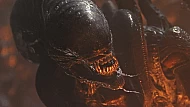We’re going to warn you from the outset: this post is full of Arrival spoilers. Read on at your peril.
Many great stories have been written examining the relationship between the human perception of time and its place in our emotions. Would terrifying situations be as awful if we anticipated them? Would we change our actions if we understood their future ramifications? There’s something tantalizing about these questions, and it’s interesting to see how Arrival tackles them.

Louise Banks – perfectly played by Amy Adams – understands the importance of language. And it’s communication that saves the day in Arrival. This isn’t a kaiju movie filled with rampaging monsters and epic gunfire battles. It’s a look into how words work. There's a lot of linguistic science driving the story, which makes a nice change from the usual garbled biochemistry or theoretical physics in most sci-fi movies.
Though it’s based on the short story, Story of Your Life, by Ted Chiang, there’s also a touch of Slaughterhouse-Five (by Kurt Vonnegut) in the proceedings. In that novel, the main character is abducted by aliens who teach him about time’s innate relation to the world. It’s another dimension, the aliens insist, and humans are limited by seeing time so linearly.
We begin the film by seeing images of Banks’ daughter. They are happy, then they are sad, and then the daughter dies. As viewers, we assume this is part of Banks’ backstory – something to flesh her out, the way Sandra Bullock’s dead daughter keeps her looked perfect but pained as Dr Stone in Gravity.

Whereas the aliens in Slaughterhouse-Five make the protagonist feel fatalistic – after all, he knows how and when he will die – they have the opposite effect in Arrival. Banks learns about dreadful things which will happen in her future as she learns the Heptapod language: her husband will leave her, and her beloved daughter will die. But she chooses the events which put these events in motion anyway. Banks chooses to experience sadness and grief and disappointment and fear, because of the boundless joy those moments will also contain.
Banks opts-in to a life of terrible pain, which some could argue is giving in to a deterministic view of the future. But it’s also an action of free will: she could have said no to Ian Donnelly, but instead she
The understanding of time as a circle is also apparent in the aliens’ written language. The round symbols, which constitute entire sentences without beginning or end, mirror the endlessly recursive nature of time. The language cannot be understood in parts but must be read as a whole. Time cannot be understood linearly when instead it all happens together.
But time manipulation also has a darker side, too. Arrival could easily have become a horror story, and a parable about the perils of too much knowledge. You can visit here if you need some scaring, but suffice to say the film merely hints at that emotional terror instead.
Banks tells her daughter to “come back to me” – both when she is born, and when she dies. She saw these moments before her daughter was ever born, knowing that soon she would arrive at the point in the future when her daughter physically was returned to her. Those visions are returned, in the perfect circle of looped time. Try and see Arrival before it’s gone: it might be a long time before such a profound film comes around again.

Project Hail Mary (2026) sneak peek debuts new footage from the movie!
Ryan Gosling gives us a sneak peek of Project Hail Mary during the Winter Olympics, showcasing new footage!

Final trailer for Project Hail Mary – the Ryan Gosling sci-fi movie has landed!
Ryan Gosling must work with an intelligent alien creature to devise a way to save Earth from destruction!

What’s Next For The Alien Franchise?
Explore what’s next for one of the world’s most successful franchises in Alien – movies, tv shows, games and more.

FROM Season 4 arrives April 19th, 2026!
The mind-bending sci-fi thriller returns for a fourth season this April on Prime Video!

Pluribus Creator Intended to Riff Off Genre Headliners, But Perhaps Didn’t Expect This Connection
From the creator of Breaking Bad and Better Call Saul, expectations were notably high for the Apple TV+ release of Pluribus. The platform’s risi...


